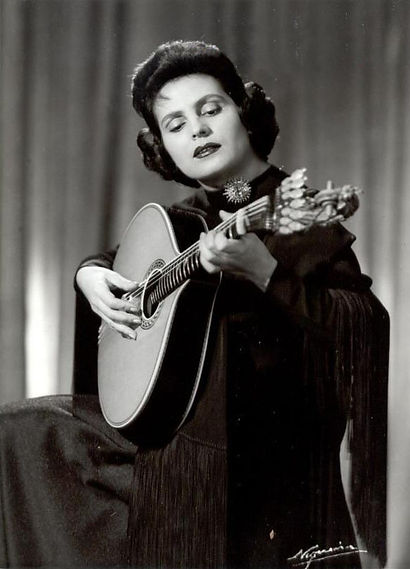
Amália Rodrigues

Elaine Avila
WORKPLAY 2018
Found and Lost in Fado
by Elaina Avila
Found and Lost in Fado is a tale of love and ghosts set in the back alleys and brothels of old Lisbon. Part concert, part theatre, the story of a young woman confronting her country’s fascist past and her own identity is interwoven with the heartbreaking national music of Portugal known as fado, which means “fate.”
Fado (Portuguese pronunciation: [ˈfaðu]; "destiny, fate") is a music genre that can be traced to the 1820s in Lisbon, Portugal, but probably has much earlier origins. Fado historian and scholar Rui Vieira Nery states that "the only reliable information on the history of Fado was orally transmitted and goes back to the 1820s and 1830s at best. But even that information was frequently modified within the generational transmission process that made it reach us today." Although the origins are difficult to trace, today fado is commonly regarded as simply a form of song which can be about anything, but must follow a certain traditional structure. In popular belief, fado is a form of music characterized by mournful tunes and lyrics, often about the sea or the life of the poor, and infused with a sentiment of resignation, fate and melancholia. This is loosely captured by the Portuguese word saudade, or longing, symbolizing a feeling of loss (a permanent, irreparable loss and its consequent lifelong damage). This is similar to the character of several musical genres in Portuguese ex-colonies such as morna from Cape Verde, which may be historically linked to fado in its earlier form and have retained its rhythmic heritage. This connection to the music of a historic Portuguese urban and maritime proletariat (sailors, bohemians, dock workers, port traders, fishwives and other working-class people) can also be found in Brazilian modinha and Indonesian kroncong, although all these music genres subsequently developed their own independent traditions. Famous singers of fado include Amália Rodrigues, Dulce Pontes, Carlos do Carmo, Mariza, Mafalda Arnauth, António Zambujo, Ana Moura, Camané, Helder Moutinho, Carminho, Mísia, Cristina Branco, Gisela João and Katia Guerreiro. On 27 November 2011, fado was added to the UNESCO Intangible Cultural Heritage Lists. It is one of two Portuguese music traditions part of the lists, the other being Cante Alentejano.
Elaine Avila, a Canadian playwright of Azorean/Portuguese descent, has a passion for exploring untold stories. Frequently incorporating music, politics and humor, her work is described as “bold, intelligent, forthright, spirited, compassionate… inviting, wide-ranging” (Caridad Svich), “open, generous” (Erik Ehn) and “a wonderful writer, tremendously gifted, reliable, and innovative.” (Suzan-Lori Parks). Her plays have premiered in Edmonton, Vancouver, Victoria, Toronto, New York City, Seattle, New Mexico, Lisbon, Portugal and London, England. Recent/upcoming work: Jane Austen, Action Figure; Kitimat; Quality: the Shoe Play, Lieutenant Nun, Burn Gloom, La Frontera/The Border, Lost and Found in Fado. Awards: Victoria Critic’s Circle for Best New Play, Audience Favorite Festival de Cocos, Panama City; Winner, Disquiet International Short Play Competition, Lisbon; Canada Council (numerous). She has taught in universities from British Columbia to Tasmania, China to Panama. Publications include: NoPassport Press (Jane Austen, Action Figure and other Plays, in 24 Gun Control Plays), Howlround, Canadian Theatre Review, American Theater, Café Onda, TCG Circles (Artistry and Innovation, Crossing Borders) Contemporary Theatre Review, Lusitania. She is the Playwright in Residence at Pomona College in Los Angeles and was recently distinguished as a descendentes notáveis (Notable Descendant) for her theatre work by the Government of the Azores, Portugal.”


